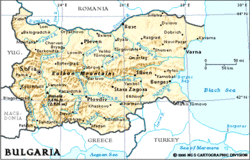
Bulgaria was one of five EU member states told to amend legislation on the acquisition of agricultural land, as the European Commission argued that their respective laws contained provisions that violated the free movement of capital and freedom of establishment.
Commission pushes Eastern states to ease farmland ownership rules
By Jenny Hopkinson
The European Commission is giving five Eastern European countries two months to bring their agricultural land purchasing rules in line with the European Union standards or it may pursue legal action.
Bulgaria, Hungary, Slovakia, Lithuania and Latvia have land purchasing rules on the books that are too restrictive and would limit free movement of capital and EU residents from elsewhere from buying farms within those countries, the Commission said in a press release today.
The five countries each adopted new farmland acquisition laws in 2014 in line with requirements for joining the EU. The commission sent letters to those national governments last spring warning of the problems with the rules, though they didn’t spur the needed changes, according to the statement.
In particular, Bulgaria and Slovakia’s laws dictate buyers must be long-term residents, which limits purchases by other EU nationals. Hungary requires a buyer to farm the land himself while Latvia and Lithuania mandate that buyers qualify as farmers.
“While the Commission agrees that national authorities should be able to properly regulate farm land markets to maintain such land in agricultural use and promote local development, it found a number of these measures excessively restrictive and discriminatory in terms of attracting investment in rural development,” the Commission said.
If the countries decline to bring their laws in line with the EU standards, the Commission said it may send the case to the EU Court of Justice.
--
Sofia Globe | 26 May 2016
The European Commission said on May 26 that it was stepping up the infringement proceedings against Bulgaria over restrictions against selling land to foreigners, while also opening an infringement procedure regarding EU rules on public procurement and concessions.
Bulgaria was one of five EU member states told to amend legislation on the acquisition of agricultural land, as the Commission argued that their respective laws contained provisions that violated the free movement of capital and freedom of establishment.
In Bulgaria’s case, the concern raised by the Commission was that under the current laws, prospective buyers must be long-term residents in the country, which discriminated against other EU nationals.
In recent years, Bulgaria has legislated restrictions on the sale of agricultural land to non-EU foreign individuals and companies, although the country backtracked, in 2015, on a provision for huge fines for public companies with non-EU shareholders, and offshore entities, found owning agricultural land after May 1 2015.
The issue of banning foreigners from owning agricultural land in Bulgaria had been pushed mainly by nationalist and populist political forces, but made it on to the statute books with the backing of members of more mainstream parties.
Last year, the EC opened the infringement proceedings, but its latest request to amend legislation took the form of a reasoned opinion, the second stage of the proceedings. Should Bulgaria fail to comply with the request within two months, the Commission can refer the country to the European Court of Justice.
Separately, Bulgaria was also among 21 member states to receive a letter of formal notice – the first stage of the infringement proceedings – with which the EC asked that the countries “comply with their obligation to transpose EU directives into their national legal order in a timely manner”.
The letters refer to the three directives on public procurement and concessions, adopted in 2014, meant to make the process more efficient and transparent. “Authorities that have already made the transition to e-procurement report savings between five per cent and 20 per cent. With EU Member States spending yearly more than 1.9 trillion euro for procurement, each five per cent saved could return almost 100 billion euro to the public purse,” the Commission said.
Bulgaria has amended its public procurement and concession laws on an almost annual basis in recent years, with a new bill currently in the draft stage. It has been delayed in recent months as some provisions – an increase in the maximum length of a concession, in particular – have proved controversial and failed to gather enough support among the parties in Bulgaria’s ruling coalition, media reports said.












